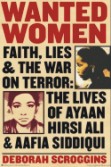True story of women as terror masterminds?
Nidhi Mathur?
 Wanted Women: Faith, Lies and the War on Terror, Deborah Scroggins, HarperCollins, Pp 540, $ 27.99?
Wanted Women: Faith, Lies and the War on Terror, Deborah Scroggins, HarperCollins, Pp 540, $ 27.99?
This book presents the story of two Muslim women from two different backgrounds – one from Pakistan and another from Somalia – and living different lives but who are to become later on in life icons of the war on terror. Strangely, though they lead parallel lives, the two at first, seem to have nothing in common but on reading further into their lives the similarities begin to surface.
Both Ayaan Hirsi Ali from Somalia and Aafia Siddiqui from Pakistan are in their early thirties, fiercely intelligent and hailing from politically ambitious families. They have both been tossed about among Africa, Asia, Europe and the US ever since childhood. Both come to land in the West from the periphery of Islam just as the Cold War is ending and who have already experienced the Muslim world’s new order of failed States and wars without end.
When it comes to dealing with the crisis of Islam, they are mirror opposites, but there are hints in their complicated backgrounds that each woman might have gone in a different direction, perhaps even to the extent of Affia Siddiqui becoming a Westernising feminist or Ayaan Hirsi Ali becoming a militant Islamic.
Ayaan, a self-described atheist, flirts with political Islam as a teenager. Aafia, a fervent Muslim, has studied feminist theory at one of the United States’ finest universities. They share a kind of warmer mentality. Both prize fearlessness. They are both rebels, though Ayaan rebels against Islam while Aafia says she rebelled to save Islam more completely. Both have been indoctrinated at an early age into the obsessive anti-Semetism “that is such a disturbing feature of modern political Islam,” says the author. Ayaan ultimately rejects it; Aafia embraces it.
The author travelled to Pakistan and to the Netherlands to write about each of them. The turbulent life of the two protagonists is very touchingly portrayed to show the two women as products of our migratory times. Both grow up on the move between countries and cultures, taking refuge in universal identities. Ayaan chooses the West and Aafia choses Islam. Ayaan’s sweeping criticism of Islam and Muslims leads her to be threatened while the help that Aafia gives to Al Qaeda leads the US to hunt her down in “its shadowy war against jihad.”
This book keeps you glued to its pages till the very end.
(HarperCollins Publishers, 10 East 53rd Street, New York, NY 100 22; www.harpercollins.com)















Comments